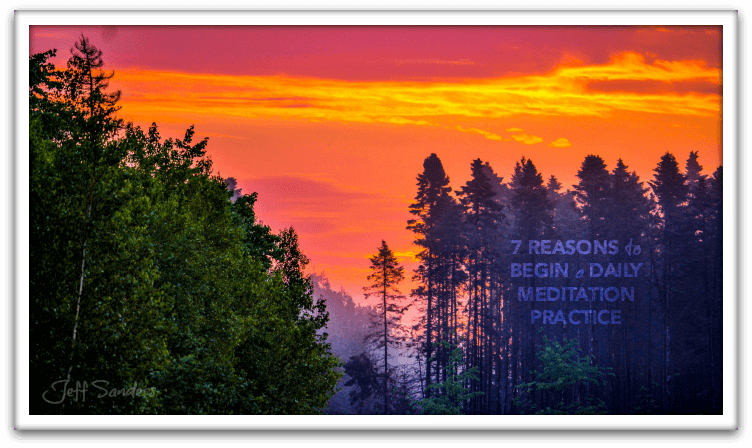7 Compelling Reasons to Begin
a Daily Meditation Practice
Getting a guy like me to meditate is a hard sell. I’m not the type to sit still for too long.
However, despite my own apprehensions, and thoughts of beginning a fluffy or “new agey” habit, adopting a daily meditation practice may be one of the best things I have ever done for my sanity or productivity.

Photo Credit: James P. Mann
5 AM Miracle Premium
* This Archive Episode is Available Exclusively on 5 AM Miracle Premium *
I have admitted multiple times on my podcast that I have started and stopped meditating multiple times in my life.
Most recently, I was chatting with Broadway star Stephanie Gibson on episode 117 and she made a great argument for re-starting this on-again, off-again routine of mine.
I decided to do a little digging, start meditating yet again, and finally convince myself to get this habit to stick for good. Hopefully, you will find this as persuasive as I did.
7 Reasons to Meditate Every Day
In my research I found quite a bit of scientific data and even more anecdotal benefits of meditation. Since I’m not a medical doctor, and it’s so easy to Google “benefits of meditation based on science,” I will share seven reasons to meditate every day through the lens of an over-programmed productivity junkie.
If you’re anything like me and you just need someone to tell you why you should stop doing your work on a Thursday afternoon to just sit on a couch with your eyes closed for 15 minutes, this is it.
1. You Remember to Breathe
Most guided sessions of meditation, yoga, or even massage therapy begin with 3 deep breaths. For the longest time I associated this practice and breathing deeply with relaxation, and that’s true.
However, as I have begun to meditate more I have caught myself in the middle of the day forgetting to breathe. Not that I pass out from lack of oxygen, but I notice my shallow breathing. I notice my stress levels and anxiety with a keener awareness than before.
Breathing is one of the most natural parts of life and yet putting a little intentionality behind it brings this common activity to a whole new level.
When I catch myself in a moment of high tension, I take just a few seconds to breathe deeply and return to my work with the oxygen my brain needs to tackle the task in front of me.
2. You Connect the Dots When You Otherwise Couldn’t
I am the kind of guy who likes to barrel through a hard task. I clench my fists and fight through the muck, assuming that more force will produce the result I want.
This strategy is successful some of the time, and works well with small challenges, but it only brings headaches and frustration when the challenges get tougher.
Meditation provides a moment of clarity, a break in the madness that lets your subconscious mind do the heavy lifting.
If you’re a golfer or baseball player, you know how it feels when you relax and hit the ball on the sweet spot of your club. With minimal effort you can have extraordinary power. That’s good meditation.
3. The Good Ideas Float to the Surface
Like most people, I was under the impression that meditation was about clearing your mind of all your thoughts. Turns out, that’s not quite it.
If you have ever meditated while taking a break from a tough task you know how it feels to have your mind flood with thoughts — usually so many thoughts you don’t know how to handle it.
But, after breathing deeply for a few minutes and slowing down your mind you notice fewer thoughts. Not zero thoughts, just fewer.
What has surprised me the most is that after a few more minutes I still have thoughts, but they are better thoughts. It’s as though meditation is a filter that weeds out the nonsense and leaves behind ideas that matter.
Sometimes those ideas are actionable tasks, but most often they are just high-quality positive concepts that I can roll around in my mind and simmer for a few minutes.
After a while, meditation becomes a practice in letting things take all the time they need, instead of trying to force everything through a predetermined, hyperactive schedule of super intensity.
As a busy productivity junkie, this is a practice I need more than any other.
4. You Have Time to Think About Something Really Wonderful
On most days I move quickly. There isn’t time to be philosophical, or to pontificate over theory. My days are structured, actionable, and efficient, but that doesn’t make them great by default.
In my meditation practice I rely on guided meditations from the Calm App, Buddhify, and Headspace.
All of these guided sessions and many others just like them provide the opportunity to let your mind, heart, and soul embrace something beautiful. In as little as 10 minutes I can transform my attitude by simply thinking about gratitude, peace, and forgiveness.
Allowing yourself the opportunity to be in touch with your own emotions is not only healthy, it’s necessary when your calendar demands you to be on point for so many hours each day.
5. You Get to Let Go of Control for Just a Minute
Taking bold action is one of my mantras. I love being in control and, of course, dominating my day. However, I actually find more peace and serenity when I let someone else take the reins for a minute.
Guided meditations are like being told what to do instead of being in charge. What I love most about having someone else guide me through a session is that I can simply let that anonymous voice lead the way. They are in charge and I am just a temporary follower.
We all seek to be led in one way or another, and it’s personally beneficial to let someone else walk you through your own mental mess.
6. If You Stick With it, Your Brain Gets Better
Now, I said I wouldn’t get into any science, but this is just too cool to pass up. There is a lot of developing research that is pointing to an amazing reality about meditation — it actually restructures your brain.
Meditation has been shown to grow gray matter in the brain, which means that all the time you spend “thinking about nothing” is actually doing quite a bit of something.
In a study published in the journal NeuroImage in 2009, [Eileen] Luders and her colleagues compared the brains of 22 meditators and 22 age-matched nonmeditators and found that the meditators (who practiced a wide range of traditions and had between five and 46 years of meditation experience) had more gray matter in regions of the brain that are important for attention, emotion regulation, and mental flexibility.
Increased gray matter typically makes an area of the brain more efficient or powerful at processing information. Luders believes that the increased gray matter in the meditators’ brains should make them better at controlling their attention, managing their emotions, and making mindful choices.
– Your Brain on Meditation
7. I Love a Good Challenge and I Think You Do Too
Here’s the kicker — meditating every day is not going to be easy. In fact, it hasn’t been. I have already missed multiple days in my own practice.
But, the challenge of doing something that so obviously opposes how I normally operate can certainly bring many positive changes. When you challenge yourself to step out of your comfort zone, even for just a few minutes, it can have profound benefits.
If these reasons for beginning a daily meditation practice are appealing to you on any level, then I want to challenge you today.
Take a look here.
Your Mission, If You Choose to Accept It
I challenge you to meditate for 10 minutes a day for the next 7 days and record why you will continue this practice.
Record what happened on paper each day. Then, email me directly and tell me how it went.
Keep these questions in mind as you record your meditation experience:
What did you feel?
What did you experience?
What thoughts ran through your mind?
What actionable ideas popped into your head?
What did you struggle with?
What distracted you?
What brought you back on track?
How did you body feel?
How did your mind feel afterwards?
Did you use a guided meditation?
If so, how did that go for you?
When will you meditate again?
Most importantly, why?
Meditation is a powerful tool and I know it can have profound benefits in your life.
Take a moment right now and schedule 10 minutes on your calendar when you can be alone to just breathe. That’s really all it takes.








